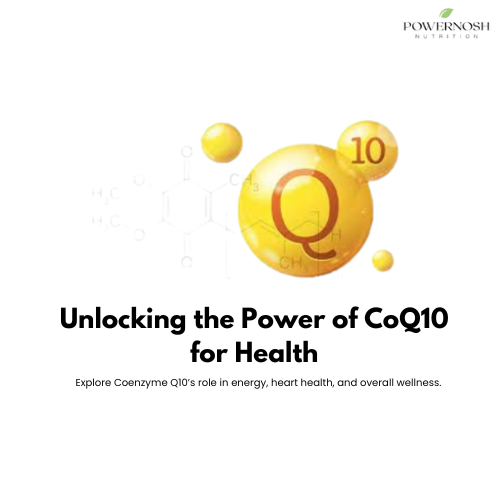
Coenzyme Q10: The Key to Energy, Heart Health & Wellness
Share
Coenzyme Q10, often referred to as CoQ10, is a vital compound found in every cell of the human body. It plays a crucial role in cellular energy production and serves as a potent antioxidant, protecting cells from oxidative damage. CoQ10 is naturally produced by the body and is also obtained from dietary sources or supplements. Its importance for overall health and wellness has led to growing interest in its potential benefits for men's sexual wellness and women's health.
Nutritional Value and Composition of Coenzyme Q10:
Coenzyme Q10 is a fat-soluble compound that resembles a vitamin and is structurally similar to vitamins E and K. It is primarily located in the mitochondria, the powerhouse of the cell, where it participates in the production of adenosine triphosphate (ATP), the molecule that stores and releases energy for cellular processes. CoQ10 also acts as an antioxidant, scavenging harmful free radicals and protecting cells from oxidative damage.
While the body can synthesize CoQ10 on its own, dietary sources of CoQ10 include meat, fish, poultry, and nuts. However, the amount of CoQ10 obtained from food sources is relatively small compared to what the body produces. As a result, some individuals may benefit from CoQ10 supplements to ensure an adequate intake of this essential nutrient.
Health Benefits of Coenzyme Q10:
Coenzyme Q10 has been studied for its potential health benefits across various domains:
-
Men's Sexual Wellness: CoQ10 has garnered attention for its potential role in supporting men's sexual wellness. Research suggests that CoQ10 may improve erectile function and libido by enhancing blood flow to the genitals and promoting the production of nitric oxide, a molecule involved in vasodilation and smooth muscle relaxation.
-
Women's Health: In addition to its benefits for men, CoQ10 may also support women's health, particularly in the realm of fertility and reproductive function. Studies have shown that CoQ10 supplementation may improve egg quality and ovarian function in women undergoing fertility treatments. Furthermore, CoQ10's antioxidant properties may help protect eggs and reproductive tissues from oxidative damage.
-
Cardiovascular Health: Coenzyme Q10 plays a crucial role in maintaining cardiovascular health by supporting energy production in the heart muscle and improving circulation. Research suggests that CoQ10 supplementation may help lower blood pressure, reduce inflammation, and improve heart function in individuals with heart disease or hypertension.
-
Energy Metabolism: As a key component of the mitochondrial electron transport chain, CoQ10 is essential for cellular energy production. Adequate levels of CoQ10 are necessary for optimal metabolism and overall energy levels. Supplementation with CoQ10 may help boost energy levels and reduce fatigue, particularly in individuals with mitochondrial disorders or chronic fatigue syndrome.
-
Antioxidant Activity: Coenzyme Q10 acts as a potent antioxidant, protecting cells from oxidative damage caused by free radicals. Oxidative stress has been implicated in the development of various chronic diseases, including cancer, neurodegenerative disorders, and cardiovascular disease. By neutralizing free radicals, CoQ10 helps maintain cellular health and may reduce the risk of age-related diseases.
Culinary Uses and Food Sources of Coenzyme Q10:
While Coenzyme Q10 is naturally present in small amounts in certain foods, including meat, fish, poultry, and nuts, its concentration is relatively low compared to what the body produces. Therefore, obtaining sufficient CoQ10 from dietary sources alone may be challenging for some individuals.
For those looking to increase their intake of CoQ10 through food, incorporating CoQ10-rich foods into their diet is a good place to start. Including more organ meats like liver, heart, and kidney, fatty fish such as salmon and mackerel, and nuts like peanuts and sesame seeds can help boost CoQ10 levels. However, for those who may not consume these foods regularly or have specific dietary restrictions, CoQ10 supplements may be a more practical option.
Safety Considerations and Side Effects of Coenzyme Q10:
Coenzyme Q10 is generally considered safe for most people when taken orally at recommended dosages. However, some individuals may experience mild side effects such as digestive upset, nausea, or diarrhea, particularly at higher doses. It is essential to follow the recommended dosage guidelines provided by healthcare professionals or on the product label to minimize the risk of adverse effects.
Additionally, individuals who are pregnant, breastfeeding, or taking medications should consult with a healthcare provider before starting CoQ10 supplementation to ensure safety and avoid potential interactions. Coenzyme Q10 supplements may interact with certain medications, including blood thinners, blood pressure medications, and chemotherapy drugs, affecting their effectiveness or increasing the risk of side effects.
Conclusion:
In conclusion, Coenzyme Q10 is a vital nutrient that plays a crucial role in cellular energy production and antioxidant activity. Its potential benefits for men's sexual wellness, women's health, cardiovascular health, energy metabolism, and overall well-being make it an important component of a healthy diet and lifestyle. While CoQ10 can be obtained from dietary sources, supplementation may be necessary for some individuals to ensure an adequate intake. As with any supplement, it is essential to use CoQ10 responsibly and consult with a healthcare professional if you have any questions or concerns about its use.
Source link
https://www.ncbi.nlm.nih.gov/pmc/articles/PMC8513668/
https://www.healthline.com/nutrition/coenzyme-q10#TOC_TITLE_HDR_4

